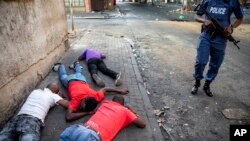By Darren Taylor and Gibbs Dube
JOHANNESBURG – South Africa has begun assessing the toll of the week’s anti-immigrant violence, which, according to authorities, has claimed 10 lives, injured scores more, incited fear, hobbled business activity and strained relations with other African countries.
In a televised address Thursday, President Cyril Ramaphosa denounced the attacks that began Sunday, mobilized by South African truckers and others who contend that immigrants have taken job opportunities from the native-born. Individuals have been attacked, homes and businesses ransacked or even ruined.
“No amount of anger and frustration and grievance can justify such acts of wanton destruction and criminality,” the president said. “There can be no excuse for the attacks on homes and businesses of foreign nationals, just as there can be no excuse whatsoever for xenophobia or any form of intolerance.”
Ramaphosa said at least two of the 10 dead were foreigners, though he did not disclose their home countries. He also said 423 people had been arrested in the country’s northeastern Gauteng province, where both Johannesburg and the capital city, Pretoria, are located.
The violence in South Africa seemed to have subsided Thursday, with police patrols on high alert in those cities.
But in the Democratic Republic of Congo, people broke windows at the South African consulate and looted stores in the city of Lubumbashi and protested outside the country’s embassy in the capital, Kinshasa, the French news agency AFP reported.
In Nigeria, security has been heightened around South African diplomatic missions and South African-owned businesses following demonstrations and apparent retaliatory attacks. On Wednesday, Pretoria temporarily shuttered its missions in Lagos and Abuja, seeking to protect staff and visitors. Telecom operator MTN closed stores in Nigeria after several attacks; likewise, grocer Shoprite Holdings halted operations at some of its stores at home as well as in Nigeria and Zambia.
There are other signs of fraying relations between the continent’s two economic powerhouses. Nigeria, which has the larger population and economy, on Wednesday recalled its ambassador to South Africa.
Suleiman Dahiru, a former Nigerian envoy to Sudan, said the move indicated “a serious break in diplomacy.” He chided South Africa’s leader, saying Ramaphosa should have spoken out sooner and also should have deployed security forces to halt anti-immigrant troublemakers.
Nigeria’s President Muhammadu Buhari also registered his concern by sending an envoy to Pretoria – and by not sending a delegation to the World Economic Forum on Africa, a three-day event concluding Friday. The leaders of Rwanda, the DRC and Malawi also declined to participate.
OPPOSED TO ILLEGAL IMMIGRANTS
Meanwhile, in South Africa, a member of a group that helped initiate the anti-immigrant protests, says talks are scheduled for this Sunday with Police Minister Bheki Cele in Johannesburg. VOA could not reach Cele’s office Thursday to confirm.
The South African, who requested anonymity in order to speak more freely, said he belongs to the All Truck Drivers’ Foundation, which organized protests along with the group Mzansi Wethu. He said the two groups would continue to “peacefully” visit workplaces to eject migrants working without proper documents.
“We are not encouraging anyone to attack these foreigners, but we want all foreigners working here illegally to leave the country,” he said, vowing the action would continue “until the government prevents people from coming here illegally.”
‘I’M SO TRAUMATIZED’
Meanwhile, some immigrants expressed anxiety about remaining in the country.
Emmanuel Manyere, a 45-year-old commercial truck driver from Zimbabwe, said he lost all his possessions during a home invasion Monday in Jeppestown, a Johannesburg suburb.
“They took whatever they wanted and they burned everything – things like my refrigerator, radio, TV. And when I came from work, I found nothing,” said Manyere, who blamed a South African gang that claims foreigners take jobs and sell dangerous drugs to locals.
Manyere said his family, including five children, want him to return to them in Zimbabwe. For now, he’s staying with a friend. “As Africans, you can’t go back home without something” for the family, he said. “If I can raise some money, I’m thinking of going back home. I’m so traumatized.”
Somali native Ahmed Hussein is unnerved. For a decade, he has sold groceries, clothes and electronics from his small shop near the edge of Johannesburg. He said he and three other Somalis and several others closed themselves in the shop when protesters arrived earlier this week.
“Then, hundreds of protesters attacked us at the same time and broke the doors. We couldn’t protect our properties, but we managed to run and save our lives.” Ahmed said. “We lost between and $80,000 and $90,000 worth of properties and goods, and some cash.”
Another Somali trader, Mohamed Abndullaahi Diriye, said attackers looted and burned his store near Pretoria. “They also burned a truck we used to use to transport the goods,” he said, saying he lost merchandise worth close to $200,000. “Some of my colleagues were also injured in the attack but survived.”
Diriye’s next move is unclear. “We came here as refugees when we fled from Somalia. We settled in, started businesses and had a better life until now, but the situation is now even worse than in Somalia,” he said. “… The only option is to appeal to the Somali government to intervene in the situation and talk to the South African government.”
Low-level anti-immigrant violence is a persistent threat in South Africa, peaking in 2008 with a series of attacks that left 67 people dead.
Darren Taylor reported from Johannesburg. Other contributors include: Saleh Shehu Ashaka and Mahmud Ibrahim Kwari from Nigeria; Ahmed Ali Sheikh from Somalia; and Gibbs Dube, Binta Yero and Carol Guensburg from Washington.




